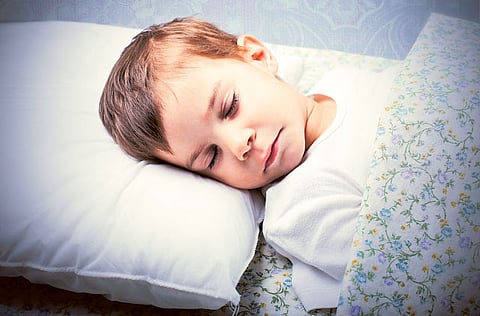Is your child counting sheep?
Several behavioural problems of children could be attributed to poor sleeping habits

Dubai: ‘Sleep tight, don’t let the bed bugs bite’ is a playful instruction given to kids at bedtime. However, if you care to skip over the elements of rhyme and humour in the phrase, you will find the underlying message is serious.
A good night’s sleep is integral to a child’s well-being.
According to Dr Onita Nakra, educational psychologist and counsellor, American School of Dubai, sleep deprivation affects a child negatively. “It can impact a child’s health, safety, development, learning, and behaviour.”
Several behavioural problems parents experience with their child could be attributed to lack of proper sleeping habits, according to her. “A common complaint is difficulty focusing and concentrating, or poor retention at school. A tired child also has difficulties focusing in the classroom.” On the other hand. sound sleepers get better grades, she says. “Inadequate sleep reduces concentration, problem solving, verbal fluency and creativity — skills required for all kinds of learning. Experts believe that during sleep, the brain replays and rehearses knowledge acquired during the day, improving memory. University of Louisville researchers found that children with late or irregular bedtimes don’t do as well in school.”
So how does a parent gauge what is a good night’s sleep? More importantly, how many hours can be considered good enough? This depends on the child’s age, Dr Nakra says. A younger child needs far more hours of sleep than a 10-year-old.
To solve disruptive sleep patterns, a parent must understand the cause. Quite often, the accusatory finger points towards the parent.
Take the UAE for instance. “You can see young children staying awake and running around malls past midnight,” she says. “Parents are often surprised when asked about bedtimes. One parent said to me, ‘I let my child run around till she falls asleep and that can be anywhere’.”
The problem partly lies with the fact that many parents coordinate their child’s sleeping times around their own working hours, Says Dr Nakra. “They don’t realise that young children need a full cycle of 10 hours sleep at night. Putting kids to bed for two to three hours in the afternoon, as that’s the time they have nobody to supervise them, is not the solution.”
What is the solution? “One of the hardest things to change is sleeping patterns so the earlier these are established and maintained the better the long-term benefits,” she says. “During weekends and vacations, it is important to stick with bedtime routines, especially for young children. Many parents let their children sleep in later. As a result, getting them back into the sleep routine becomes a battle.”
For some parents, allowing their child to sleep with them is often taken as a solution. Is this helpful? Dr Nakra says, “Families have different approaches to allowing their children to sleep with them. Many parents refuse to make a big deal of it; others may grumble and give in. Still others prefer to take a firm approach and refuse. There isn’t one approach that is best. Obviously a parent needs to choose a logical and reasonable method that can be applied consistently.”
While parents have trouble with the sleep cycles of young kids, teenagers pose a challenge as well. “It is confirmed that most teenagers are night owls, preferring to stay awake at night, and sleep during the day. What is fairly new information is research showing that teens may be the most-sleep-deprived of all — their sleep needs can be as high as those of a pre-schooler [nine to 10 hours a night]. This sleep deprivation affects memory, reaction time and mood, putting teenagers at higher risk for car accidents and increasing their stress.”
Sign up for the Daily Briefing
Get the latest news and updates straight to your inbox

